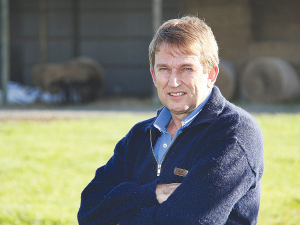Santa's present for the primary sector - an FTA with India
Primary sector leaders have welcomed the announcement of a Free Trade Agreement between India and New Zealand.
 Malcolm Bailey, DCANZ, says it's a lousy deal, a significantly missed opportunity and sets an awful precedent for any future trade negotiations.
Malcolm Bailey, DCANZ, says it's a lousy deal, a significantly missed opportunity and sets an awful precedent for any future trade negotiations.
The chair of the organisation which represents all the New Zealand dairy companies has hit out at government politicians for failing to deliver a quality FTA with the EU for the dairy sector.
Malcolm Bailey, Dairy Companies Association of NZ (DCANZ), says the parameters the politicians finally set for the negotiations made it virtually impossible for our highly skilled trade negotiators to pull off a good deal for what he calls one of the big engine rooms of the NZ economy - the dairy industry.
"This is a lousy deal, a significantly missed opportunity and sets an awful precedent for any future trade negotiations," he says.
Bailey, who was in Brussels when the final touches were being put on the deal, says he had a sleepless night when he heard that the message from the Government to the negotiators was 'anything better than the status quo'.
He says DCANZ had urged them to keep on negotiating to get a better deal for dairy and says they were surprised at the approach they took.
He says the change in the language and the fact that NZ had signalled that it wanted a deal by June 30 was something of a cue to the EU negotiators, who knowing NZ's bottom line, appeared to adopt a tactic of stalling the negotiations and counting down the clock to the end of June.
"This appears to have made it extremely difficult for our negotiators to deliver something meaningful for the dairy and beef sectors.
"We don't use this phrase 'walk away' for us it is just continue the negotiation rather than settle a deal at this time if it wasn't going to be good enough and, as we have seen, it is not good enough for dairy. In the end it was a decisions made by the Government and I have already said how disappointed we are," he says.
Bailey says he's not at all critical of the MFAT trade negotiators, describing them as "top shelf people".
He says while DCANZ was not at the actual negotiating table, they worked alongside the MFAT people and provided analysis and information to assist them where necessary.
Minimal Result
Malcolm Bailey says, right from the start of the negotiations four years ago, it was clear that NZ was not going to get everything it wanted.
He says it then came down to what was really needed, which was tariff elimination - something we got in the UK FTA. He says, when this didn't look possible, the language used was 'achieving commercially meaningful outcomes' for the dairy and beef sectors.
"So what's the definition of that? Well, there is threshold of 5% open access to their market and 5% of 450 million people is reasonably significant, so that's the default if you like. But we have ended up miles below that," he says.
Bailey points to the fact that NZ gave up using the name Feta and says if you look at the gain the FTA for dairy, the result is minimal and not what we needed.
He says he also challenges claims by the Government on the financial benefits for dairy in the FTA as it stands. He says he strongly disagrees with financial gains the Government claims the industry will get as a result of this FTA. He says DCANZ has a completely different take on these.
What has surprised Bailey is a belief that the EU actually wanted to deal with NZ. He says issues such as NZ's support for Europe over the Ukraine war was a positive.
"The other thing was it was almost embarrassing for the EU not having a FTA with NZ when we are down to the last six in the world, sitting in a group that includes North Korea.
"So there was definitely a willingness and, as we have already noted, some sectors such as kiwifruit and horticultural crops have done well and I am pleased for them," he says.
Mating wrapped up last month at the across-breed Beef Progeny Test on Pāmu’s Kepler Farm in Manapouri.
Libby Judson is a keeper of memories from an age gone by. Tim Fulton tells her story.
A New Zealand-first native tree study has highlighted the Bioeconomy Science Institute's position as a forestry research leader.
Hemp fibre processor Rubisco is relocating its core processing facility to Ashburton as part of a $20-$30 million expansion to leverage what it says is an accelerating global demand for sustainable and renewable fibres.
Tradition meets some of the latest in technology at the 2026 East Coast Farming Expo.
OPINION: Trade Minister Todd McClay and the trade negotiator in government have presented Kiwis with an amazing gift for 2026 - a long awaited and critical free trade deal with India.
President Donald Trump’s decision to impose tariffs on imports into the US is doing good things for global trade, according…
Seen a giant cheese roll rolling along Southland’s roads?